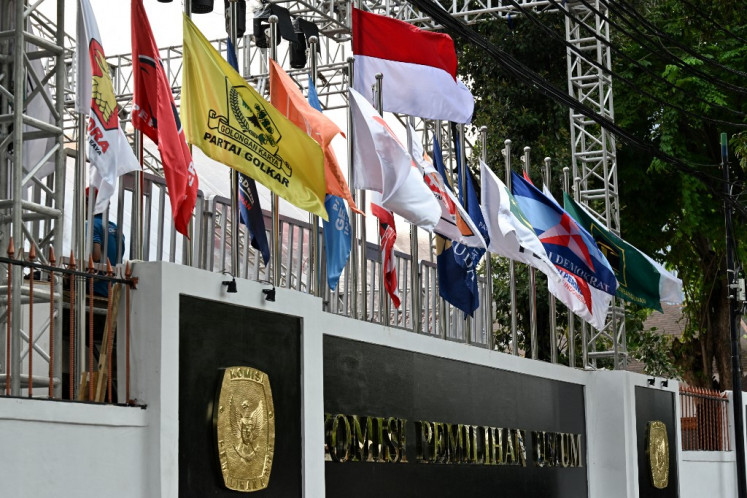Popular Reads
Top Results
Can't find what you're looking for?
View all search resultsPopular Reads
Top Results
Can't find what you're looking for?
View all search resultsInsight: Peace, DDR in Aceh cannot be taken for granted
Next week, on Aug
Change text size
Gift Premium Articles
to Anyone
Next week, on Aug. 15, 2008, we will celebrate the third anniversary of the Aceh peace agreement. Since the signing of the Helsinki peace accord on Aug. 15, 2005, a lot of progress has been made in implementing the peace agreement.
In general, the DDR process -- disarmament, demobilization and reintegration -- has run relatively smoothly. The democratic process has been relatively fair, as demonstrated by the victory of a former rebel leader in the governor race and the proliferation of local political parties.
In fact, the Aceh peace process is hailed as a conflict resolution success story by many, both within and outside Indonesia. Peter Faith, the former head of the European Union-led Aceh Monitoring Mission, which supervised the implementation of the Helsinki peace agreement, once expressed his conviction that the peace process in Aceh could become irreversible. In Indonesia, we all pray that conflict never returns to Aceh.
Yet, as we are about to celebrate the third anniversary of the peace agreement, an important voice from Aceh was aired in Jakarta recently, and deserved to be heard. Iwan Gayo, the chairman of Aceh's Committee for the Acceleration of Development in Less-Developed Regions, warned the central government it should pay attention to "certain elements" within Aceh that might destroy the peace process.
Such a warning clearly deserves serious attention from the central government in Jakarta. It serves as a reminder that peace in Aceh cannot be taken for granted. The end of conflict is not guaranteed to be permanent. Indeed, many studies have shown that a relapse into conflict often occurs within the first five years of a peace agreement being signed. Empirical evidence on peace processes around the world shows that sustainable peace can only be guaranteed if the peace survives for more than a decade.
In Aceh, there is no shortage of spoilers of peace. Tension within the society has been brewing for some time now. Conflicts and incidents of violence have begun to increase. The World Bank notes that 149 new conflicts were reported in May and 166 in June (Aceh Conflict Monitoring Update, May 1-June 30, 2008). Tension within the community -- either over tsunami-related assistance or resource competition -- is also on the rise. In the run up to the 2009 elections, the political temperature continues to heats up. The crime rate also is increasing and extortion has become widespread.
The most serious problem, however, is the attempt by some areas to form two new separate provinces from Nanggroe Aceh Darussalam (NAD) province. One is to be called the Aceh Leuser Antara (ALA) province and the other is Aceh Barat Selatan (ABAS) province. Incidents of violence at the community level have already taken place over this issue. Governor Irwandi Jusuf has also made it clear he would never allow the two areas to break away from NAD Province.
Regardless of the motive behind the proposal to form the two new provinces, the risk is high if the central government and the parliament in Jakarta approve the plan. Their approval would also constitute a blatant breach of the Helsinki peace agreement and the Law on Governing Aceh. Any signs of support from Jakarta would once again create a feeling among the Acehnese that Jakarta is not sincere in implementing the peace agreement.
This kind of situation, if not dealt with swiftly and seriously, clearly serves as a recipe for a relapse into conflict. Two issues need to be remembered. First, conflict in Aceh had its roots in the absence of a sense of justice among the people. Now, as peace has been reached, and Aceh has been granted special autonomy, it is time for the Aceh local government to ensure that peace dividend is shared by all Acehnese people. And that would require an acceleration of economic development, the eradication of corruption and firm law enforcement to address the problems of crime and extortion.
Second, the central government should never forget that the absence of trust was at the center of the conflict between Aceh and the central government in Jakarta. With the Helsinki peace agreement, trust is now gradually returning to Aceh. The central government, therefore, should nurture that hard-won trust by avoiding the mistakes it has repeatedly made in the past. One Aceh is already difficult enough and fraught with problems. Two or three Acehs will surely be too hot to handle.
The writer is the deputy executive director of the Centre for Strategic and International Studies in Jakarta.










